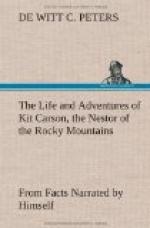The appointment of civilians to the responsible duties of a command in the United States army has, of late years, become, in many instances, very unfortunate. Perhaps it is this that has taught our legislators a lesson. But there is a truth which lies above this difficulty. The severe ordeal necessary to be gone through with at West Point, in order to make military men of the proper standard, has very naturally raised a jealousy between these two classes of men. This is very healthy for the country, as it stimulates each to noble exertions. In order to make the army less secluded, it is necessary to appoint a certain per-centage of men from the walks of private life, and therefore the most meritorious should be selected. West Point men, as a body, are a great credit to our country; and, as a scientific corps, they cannot be surpassed; but, the fact is incontrovertible, that many, if not most of the leading officers of the United States army, are self-educated, and have risen to their exalted positions by untiring industry and distinguished services. For frontier work, men, to be capable of taking command, are required to have great experience in Indian strategy, and to become accustomed to endure privations and vicissitudes. These cannot be taught by schools or books. For these positions those are best fitted who have been trained to the mountains from earliest boyhood, and where is the man in North America who has battled in this service longer or more successfully than Christopher Carson? But Kit Carson could see no reason why the votes of the United States Senators, refusing to confirm the President’s effort to reward him for his services to his country, should cause him for one moment to swerve from his duty. He pocketed at once his disappointment, and went to work. Colonel Newby informed him that the Camanches had of late been very hostile, and that they were then roaming in war parties, numbering from two to three hundred, scattered along the old Santa Fe road, on which their depredations had, so far, been mostly committed. On learning this, Kit Carson determined to make a trail of his own, and endeavor thus to avoid them. He reduced the number of his escort to ten trusty followers. With them, he returned to Taos, and after a halt there of two days, once more was on the march. At first, he traveled to the northward, until he reached a tract of country which these Indians seldom visited; then, changing his route by compass, he struck the Bijoux River, which is a tributary of the Platte River, and followed it down stream. At about twenty-five miles from the mouth of the Bijoux, he quit that stream, and struck out diagonally across the prairies, and soon reached the Platte itself, down which he journeyed to Fort Kearney. Here he again changed his course for the Republican Fork. On leaving this last-named stream, he traveled direct to Fort Leavenworth, finally reaching that post with his men and animals in fine condition, for the journey had been as pleasant as could have been expected. Here he left his escort, and set out alone for Washington. After reaching the land of railroads and steamboats, he was but a few days in bringing the latter part of his journey to an end. Handing his dispatches to the proper authorities, Kit Carson turned right about and made his way to New Mexico, where he arrived in the month of October, 1848.




